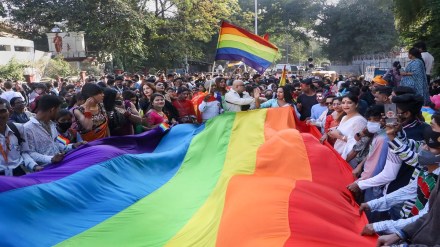The Centre on Wednesday asked the Supreme Court to leave all questions of same-sex marriage to the Parliament, saying that it is a “complex subject having a profound social impact”, reports Bar and Bench.
The top court is hearing arguments on a batch of petitions that seeks recognition of same-sex marriages under law, arguing that the right to marry a person of one’s choice should also extend to the LGBTQ++ community. The Centre has filed an application in the top court asking the court to first decide on the maintainability of the petitions.
Appearing for the Centre, Solicitor General Tushar Mehta told a five-judge Constitution bench headed by Chief Justice D Y Chandrachud on the fifth day of hearing, that “in Navtej the court recognised the right to ones sexual orientation. Here the real question is who will take a call on what constitutes marriage and between whom.”
Mehta listed out the problems that “only Parliament can take care of” and gave the history of the Hindu Marriage Act.
“For other religions by and large it remains uncodified. The social status which marriage gets I am on … The moment any right which was pre existing without recognition is recognised, it gets regulated. Law prescribes when to marry, autonomy goes,” he said to the bench also comprising justices S K Kaul, S R Bhat, Hima Kohli and P S Narasimha.
“Bigamy is prohibited. Law prohibits how many times you can marry with a living wife. There are degrees of prohibited relationships.”
“Protection of privacy is there in bedroom. But there are cases of intrusion also … For example impotence is a ground for divorce. That is something very personal, but to prove it privacy is breached. Once a legislative recognition is given to a union, it comes with it several regulatory provisions. Only Parliament can conceive of such situations, it would be impossible for the Court to conceive of all,” the Solicitor General continued.
Mehta says what has been argued so far are the questions- what is a marriage and who can marry? reported The Indian Express.
“The real question is who would take a call as to what constitutes a marriage between a particular class of people,” Mehta said.
He further argued that the Parliament has defined trangender persons very widely to include “all shades and all spectrum of what we call LGBTQ+”.
Meanwhile, Mehta told the top court that he wanted to rely on the dissent in Obergefell v Hodges — the landmark 2015 US Supreme Court ruling that recognises same-sex marriage. “It was a narrow 5-4 majority, and for us both the majority or minority opinions have the same value,” he said.
He also relied on the 2022 Dobbs vs Jackson which held that the US Constitution does not confer a right to abortion. In doing so, the US Supreme Court overruled both Roe v Wade (1973) and Planned Parenthood v Casey (1992) which had recognised a woman’s right to make reproductive choices.
CJI Chandrachud asked Mehta not to cite Dobbs, saying we have gone way beyond Dobbs.
“Dobbs represents a view of the American SC that a woman has no control over her bodily integrity. This theory has been debunked long back in our country.”
CJI Chandrachud further added, “Don’t cite Dobbs. We have gone way beyond Dobbs and fortunately so. We can at least credit ourselves that we are far ahead of our times than many of the western countries on this.”
Appearing for the petitioners, advocate Karuna Nundy said that according to the 2011 census there are at least 4.8 million transgender people in the country, which is an “underestimation”.
Advocate Arundhati Katju argued for the petitioners, saying, “There are already LGBTQ couples who have children and by not recognising the marriage you are depriving the child of parenthood and child cannot suffer because of parents belonging to a separate class under Article 15 which is a protected one.”
The hearing will continue tomorrow.
Notably, the National Commission for Protection of Child Rights (NCPCR) has opposed the conferral of adoption rights on same-sex couples, stating a study that such a child is affected socially and psychologically.
The Bar Council of India recently passed a resolution requesting the top court to leave the matter of same-sex marriage for “legislative consideration”.
